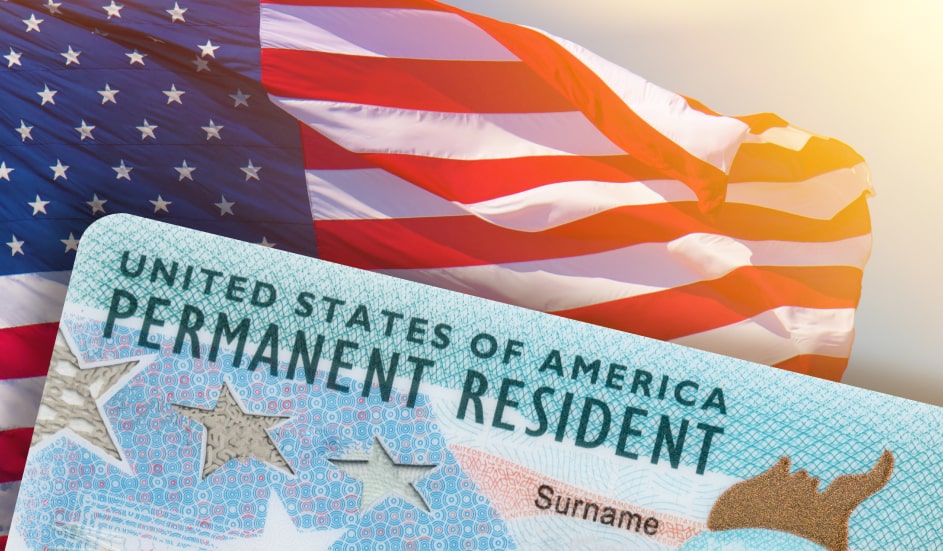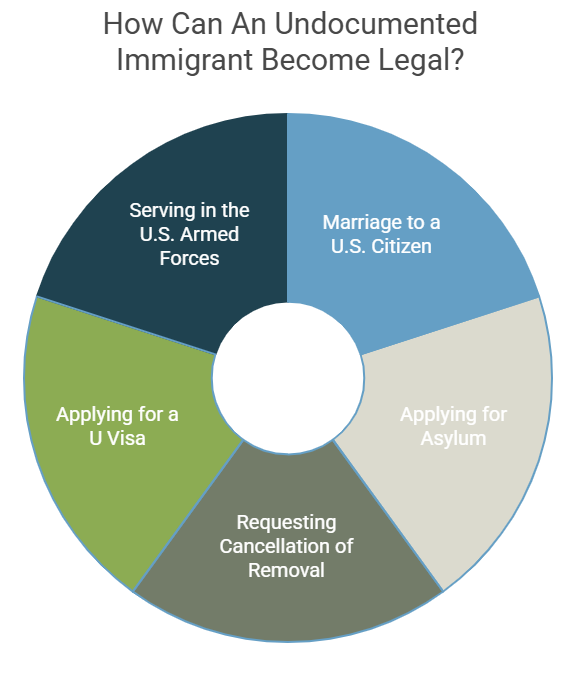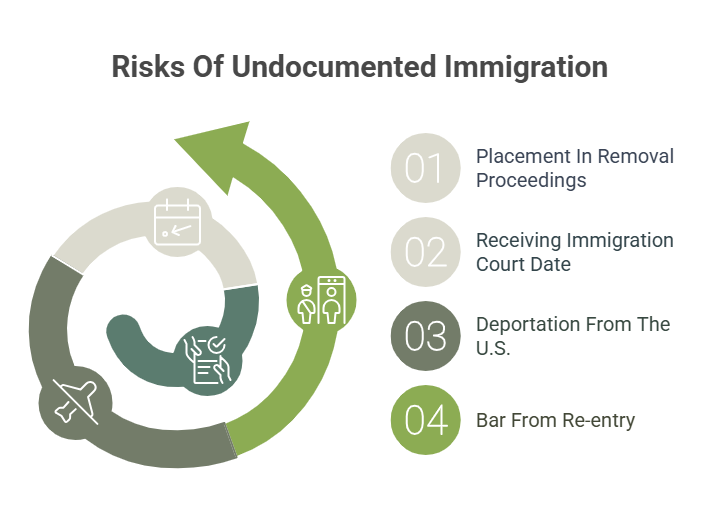

How Can Undocumented Immigrants Become Legal? Key Points
- Undocumented immigrants may become legal through family sponsorship, asylum, military service, or special visas
- Marrying a U.S. citizen or lawful permanent resident may allow you to apply for a Green Card but unlawful presence could trigger re-entry bans
- Applying for asylum may offer a path to legal status if you fear persecution in your home country
- If you’re in removal proceedings, you may qualify for cancellation of removal if you’ve lived in the U.S. for 10+ years and meet strict criteria
- If you’re a victim of a certain crime, you may be eligible for a U visa, which can lead secure legal status
- Serving in the U.S. armed forces during qualifying conflicts may open a path to a Green Card or even citizenship
Did you know that, according to estimates, there are approximately 11 million undocumented immigrants in the U.S. This number could be even higher.
If you have entered the United States illegally or have overstayed your visa, you are considered an undocumented immigrant and may face deportation.
How can an undocumented immigrant become legal?
In this guide, we’ll share:
- Ten paths to legal residency
- Who is considered an undocumented immigrant
- How a person becomes an illegal immigrant
10 Ways An Undocumented Immigrant Can Become Legal
Being undocumented in a foreign country comes with a number of challenges, including inability to work legally and access benefits, on top of the constant worry you may be sent back to your country any minute.
But is there a way out?
The following scenarios allow you to file for a Green Card application and obtain legal permanent resident status.
1. Marrying A US Citizen Or A Lawful Permanent Resident
One way to adjust your status to that of a lawful, permanent resident is if you are married to a U.S. citizen or a lawful permanent resident and file for a Green Card.
Requirements include:
- Your marriage must be bona fide, meaning you entered it in good faith, with the desire to establish a life together
- All previous marriages must be legally terminated
If you entered the U.S. legally and married a U.S. Citizen, you can apply for a Green Card as an immediate relative while still in the U.S.
This can happen regardless of how long you have overstayed your visa, provided that you were inspected and admitted into the U.S.
In this case:
- File Form I-130, Petition for Alien Relative, which serves as evidence that your marriage is legally valid
- File Form I-485, Application to Register Permanent Residence or Adjust Status, along with supporting documents
What are the challenges?
Not every entry is considered a valid admission for Green Card purposes. For example, if someone is paroled into the U.S. after inspection at a port of entry, it’s only temporary. This means they might be inspected and allowed to enter, but not officially admitted.
If you entered the U.S. legally and married a Green Card holder, you must wait for a visa to become available. Until that happens, you must return to your home country and complete the immigration process through the U.S. embassy or consulate there.
To begin the process of applying for a Green Card after marrying a lawful permanent resident and applying from outside of the U.S., file Form I-130.
What are the challenges?
If you have accrued unlawful presence in the U.S., departing to apply for a Green Card may trigger a bar to re-enter the U.S.
For example, if you stayed in the country unlawfully for more than 180 days but less than one year, you could face a three-year bar. If you stayed illegally for more than one year, this could result in a ten-year bar.
Filing a waiver before leaving the U.S. provides evidence that your spouse will suffer “extreme hardship” due to your long absence. It may waive your re-entry bar and allow you to return to the U.S. after you’ve passed your consular interview.
2. Applying For Asylum Status
Another way to become legal is to apply for asylum status. To do this, you must prove you have suffered persecution in your home country or fear being persecuted if you return, due to your:
- Political opinion
- Religion
- Race
- Nationality
- Membership in a particular social group
Whether you entered the U.S. legally or illegally, to be eligible for asylum status, you must:
- Be physically present in the U.S.
- Properly file the asylum application within a year of your last entry (there are certain exceptions).
- Be unwilling or unable to return to your home country due to past persecution or fear of being persecuted in the future.
- Not be involved in activities that can bar you from asylum such as posing a danger to U.S. security, having been sentenced for a serious crime, having been part of a group that persecuted another person based on religion, race, political opinion and other circumstances.
To start your asylum status case:
- File Form I-589, Application for Asylum and for Withholding of Removal.
- Attach the additional documents needed to support your claim.
- If you win your asylum case, you can apply for a Green Card one year later.
If your family is already in the U.S., you may add them to your asylum application form. Depending on the relationship, they can also be granted asylum.
If your family members were victims of separate persecutions, they can file for asylum status separately. If your application is denied, your family members can add you to their applications.
If your family is outside the U.S. when you obtain asylum status, file a separate application so they can join you in the U.S. This should be done within two years from the date you were granted asylum.
3. Requesting Cancellation Of Removal
If you have lived in the U.S. for an extended period and are facing removal in immigration court, you may be eligible to obtain lawful status through Non-LPR Cancellation of Removal and Adjustment of Status.
Non-LPR Cancellation of Removal is only available if you have been placed into removal proceedings. What does this mean? It means the government has initiated a legal process to deport you from the U.S. You cannot benefit from it under other conditions.
To file for a Green Card, you must meet the following criteria:
- You lived and were physically present in the U.S. for a minimum of ten years.
- Your deportation from the U.S. will cause “exceptional and extremely unusual hardship” to your spouse, child, or parent, who is a U.S. citizen or permanent resident.
- You have not violated U.S. laws and have not been convicted of certain serious crimes.
- You can show evidence of good moral character for the past ten years.
To request cancellation of removal, file Form EOIR-42B.
Also note that U.S. law allows only 4,000 Green Cards to be issued annually.
4. Applying For A U Visa
The U nonimmigrant visa was created by the Congress under the Victims of Trafficking and Violence Protection Act in October 2000.
It is given to people who have been victims of certain crimes to encourage them to cooperate with police without fear of deportation.
A U visa can provide you with legal status, employment authorization (work permit) and the possibility to apply for a Green Card under certain conditions.
To qualify for a U visa:
- The crime committed must have violated U.S. laws.
- You must have suffered physical or mental abuse as a victim of qualifying criminal activities such as abduction, hostage-taking, trafficking, involuntary servitude, domestic violence, rape, or similar circumstances.
- You must provide information about the criminal activity in question.
- You must be willing to help in the investigation of the crime.
To apply for a U visa, file Form I-918, Petition for U Nonimmigrant Status.
After you are granted a U visa, you can petition to bring your spouse and children to the U.S.
5. Serving In The US Armed Forces
You may be eligible to adjust your illegal immigrant status and apply for a Green Card or apply directly for U.S. citizenship if you have served in the U.S. armed forces during qualifying wars and conflicts, such as:
- World War I
- World War II
- The Korean War
- The Vietnam War
- The Persian Gulf War
- Operation starting September 11, 2001, including the War on Terrorism, Iraq Hostilities and Operation Enduring Freedom
To adjust your status after serving in the U.S. armed forces:
- File Form N-426, Request for Certification of Military or Naval Service.
- File Form N-400, Application for Naturalization.
Each individual scenario is unique, and your pathway to obtaining legal status as an undocumented immigrant in the U.S. may vary. To determine which pathway is right for you, contact an experienced immigration attorney.
6. Special Immigrant Juvenile Status (SIJS)
Special Immigrant Juvenile Status (SIJS) is available to certain undocumented children under 21 who have been abused, abandoned, or neglected by one or both parents.
To qualify, the child must:
-
Be under 21 years old and unmarried
-
Obtain a state court order declaring that reunification with one or both parents is not viable due to abuse, abandonment, or neglect
-
Show that returning to their home country is not in their best interest
Once SIJS is approved, the applicant may apply for a Green Card. Importantly, SIJS beneficiaries are generally exempt from certain grounds of inadmissibility, including unlawful entry in many cases.
This pathway is particularly important for undocumented minors who entered without inspection.
7. Violence Against Women Act (VAWA)
Under VAWA, certain abused spouses, children, and parents of U.S. citizens or lawful permanent residents may self-petition for legal status without the abuser’s knowledge or participation.
You may qualify if:
-
You were subjected to battery or extreme cruelty
-
You are married to, or were married to, a U.S. citizen or Green Card holder
-
You can demonstrate good moral character
A VAWA self-petition (Form I-360) allows eligible individuals to apply for work authorization and eventually adjust status to lawful permanent resident.
This protection applies to both women and men.
8. Parole in Place (PIP)
Parole in Place (PIP) is available to certain undocumented family members of U.S. military personnel, veterans, and in some cases reservists.
If granted, PIP:
-
Provides temporary lawful status
-
May allow the person to adjust status inside the U.S.
-
Can help overcome entry without inspection issues
For many undocumented individuals who entered without inspection, PIP can eliminate the need to leave the U.S. for consular processing.
9. Temporary Protected Status (TPS)
Temporary Protected Status (TPS) is available to nationals of designated countries experiencing armed conflict, environmental disasters, or other extraordinary conditions.
TPS provides:
-
Protection from deportation
-
Work authorization
-
Temporary lawful presence
While TPS does not automatically lead to a Green Card, it may create opportunities for adjustment of status depending on how the person entered the U.S. and whether they qualify under another category.
10. Employment-Based Sponsorship (In Limited Circumstances)
Although most undocumented immigrants cannot adjust through employment, there are limited scenarios where employment-based sponsorship may be possible.
These may include:
-
Individuals who were inspected and admitted but overstayed
-
Beneficiaries of grandfathering provisions under INA §245(i)
-
Individuals eligible for certain waivers
Because unlawful presence and unauthorized employment create significant barriers, this pathway requires careful legal evaluation.

Who Is Considered An Undocumented Immigrant?
An undocumented immigrant is a person who was born in a foreign country and who has no legal right to be in or remain in the United States.
Other terms used for an undocumented immigrant include:
- Unauthorized immigrant
- Unlawful non-citizen
- Illegal alien
How One Becomes An Undocumented Immigrant
One can become an undocumented immigrant through a variety of ways, including:
Expired Visa
In this situation, you entered the U.S. legally, with a valid nonimmigrant visa such as a tourist visa or a student visa.
When the U.S. Department of Homeland Security (DHS) officials inspected and admitted you into the U.S., they listed two dates in your Form I-94, Arrival/Departure Record:
- The date you arrived in the U.S.
- The date on which you were required to depart
If you stayed in the country after the approved length of your visit, you have overstayed your visa and have lost your lawful status.
In this case, as soon as the departure date passed, you began to accrue unlawful presence and became an undocumented immigrant.
Illegal Entry
If you entered the U.S. without inspection, you are considered an undocumented immigrant. Crossing the border without inspection by a U.S. border patrol agent automatically gives you illegal status.
The consequences of being caught by officials as an undocumented immigrant include:
- Being placed in removal proceedings and receiving an Immigration Court date
- Deportation from the U.S.
- A three to ten-year bar from re-entry to the U.S. depending on the length of your illegal stay

How Can Undocumented Immigrants Become Legal? Key Takeaways
- There are several legal pathways for undocumented immigrants, including marriage-based petitions, asylum, and special visas.
- You may become undocumented if you have overstayed your visa or have entered the United States without inspection.
- Some processes require you to leave the U.S., which can trigger re-entry bars if you’ve accrued unlawful presence. Make sure you seek legal guidance to ensure a positive outcome for your case.
Can I Become Legal Without Leaving the U.S.?
Whether you can become legal without leaving the United States depends mainly on how you entered and the type of relief you qualify for.
When You Can Adjust Inside the U.S.
You may be able to adjust status without leaving if:
-
You were inspected and admitted or paroled
-
You are an immediate relative of a U.S. citizen
-
You qualify under VAWA, SIJS, asylum, or Parole in Place
-
You are grandfathered under INA §245(i)
In these cases, you may file Form I-485 from within the U.S.
When You Must Leave
If you entered without inspection and do not qualify for an exception, you may need to complete your process at a U.S. consulate abroad. Leaving after accruing unlawful presence can trigger a three- or ten-year bar.
When a Waiver Is Required
If you have unlawful presence, fraud, or certain violations, you may need a waiver such as Form I-601A or I-601. Most waivers require proof that a qualifying relative would suffer extreme hardship.
Because leaving the U.S. can create serious risks, this decision should be made only after careful legal review.
How to Avoid Immigration Scams and Notarios
Undocumented immigrants are frequently targeted by fraud.
Beware of Notarios
In the U.S., a notary public is not an attorney. Notarios often promise guaranteed results or file incorrect applications, which can lead to denial or deportation.
The “10-Year Law” Myth
Living in the U.S. for ten years does not automatically give you legal status. Cancellation of removal is only available in immigration court and requires proof of exceptional and extremely unusual hardship to a qualifying relative.
Verify Before You Hire
Always confirm that the person helping you is:
-
A licensed U.S. attorney, or
-
A DOJ-accredited representative
No legitimate attorney can guarantee approval. If someone promises a Green Card without reviewing your case, that is a warning sign.
Are You An Undocumented Immigrant? Contact Spar & Bernstein For Legal Advice
With six decades of experience in immigration law, our knowledgeable and compassionate attorneys at Spar & Bernstein will:
- Review the details of your case.
- Explain your options.
- Explore options that will allow you to remain in the US legally.
“Living in the U.S. as an undocumented immigrant means working in the shadows, being unable to access medical care, and constantly fearing deportation,” says Brad Bernstein, Managing Partner at The Law Offices of Spar & Bernstein. “But there are legal options to get legal status and remain in the U.S. and our firm can help you explore the options.”
How Can An Illegal Immigrant Become Legal? FAQs
For more information on how an undocumented immigrant can become legal, check out the section below.
What are the risks of applying for legal status while undocumented?
Applying for legal status while undocumented can carry certain risks, such as being placed in removal proceedings or facing prolonged delays. Schedule a consultation with our immigration team at Spar & Bernstein to understand the challenges and prepare for the process the right way.
Can I apply for adjustment of status if my visa expired?
Yes, if your visa has expired, you may still be able to adjust your status through family or employment-based sponsorship. However, you may need to address any unlawful presence issues and apply for a waiver if necessary. Contact Spar & Bernstein for legal advice.
What can I do if my application for immigration relief is denied?
If your application for immigration relief is denied, you may have the right to appeal the decision, reapply, or explore other forms of relief. Consult with our immigration attorneys to understand the best course of action.





